Key takeaways:
- Understanding cultural nuances and local regulations is crucial for successful overseas negotiations, as it helps build rapport and avoid costly mistakes.
- Thorough research on market dynamics, competition, and legal considerations enhances negotiation outcomes and establishes credibility.
- Building strong relationships through authentic communication and follow-up is vital for long-term success in international business partnerships.
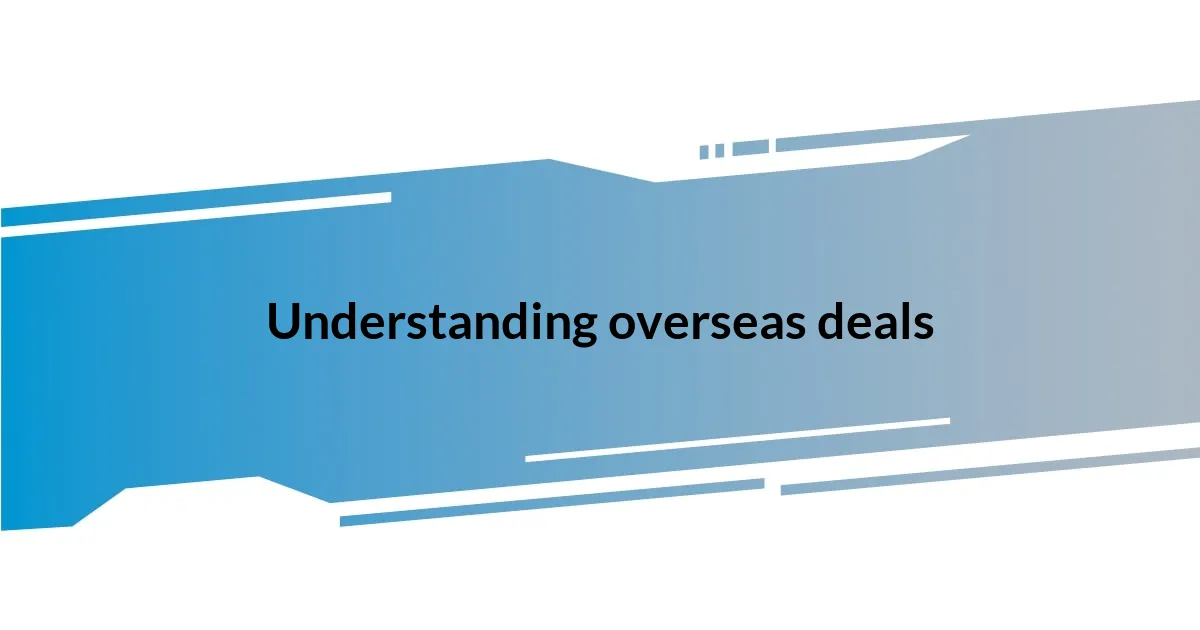
Understanding overseas deals
Understanding overseas deals requires a nuanced approach, as it often involves navigating different cultures and business practices. I vividly remember my first overseas negotiation; the differences in communication styles were striking. Have you ever felt that moment of uncertainty when trying to interpret a nod or a pause in conversation? It certainly can be disconcerting, but recognizing these subtleties can make all the difference in building rapport.
Another key aspect is the importance of local regulations and economic conditions. I once faced a situation where a seemingly straightforward deal was complicated by import tariffs and compliance issues. Reflecting on that experience, I realize how vital it is to thoroughly research the market and establish trust with local partners. How often do we underestimate the impact of these factors? Awareness is crucial; it can save you from costly mistakes.
Finally, I believe that successful overseas deals rely heavily on relationship-building. In my case, establishing a genuine connection with my international counterparts led to more seamless negotiations. Have you noticed how a bit of authenticity opens doors? The emotional investment in relationships can pave the way for smoother discussions and foster loyalty, which is invaluable in global business.

Importance of research in deals
Research is the backbone of closing successful overseas deals. I learned this lesson the hard way during a particularly complex transaction. I was excited, but I hadn’t spent enough time understanding the local market dynamics. As the negotiations progressed, I found myself at a disadvantage, outmaneuvered by a well-informed competitor. It was a wake-up call that emphasized how preemptive research can empower you to navigate potential pitfalls.
Here are key reasons why research is crucial in overseas deals:
- Cultural insights: Understanding the local culture can prevent miscommunications and build stronger relationships.
- Market analysis: Researching competitors and market trends can help you identify opportunities and threats.
- Regulatory landscape: Familiarity with local laws and regulations can save you from catastrophic compliance issues.
- Economic conditions: Grasping the economic climate allows for better forecasting and strategic planning.
- Vendor evaluations: Thoroughly vetting local partners ensures reliability and trustworthiness.
When I approached a second deal with a fresh mindset and extensive preparation, I immediately noticed the positive shift in how I’ve been perceived. I wasn’t just a name in a proposal; I was viewed as someone who respected the intricacies of their market. This switch transformed the negotiation dynamic into a collaborative effort rather than a contest of wills. I can’t stress enough how transformative thorough research can be when establishing credibility abroad.
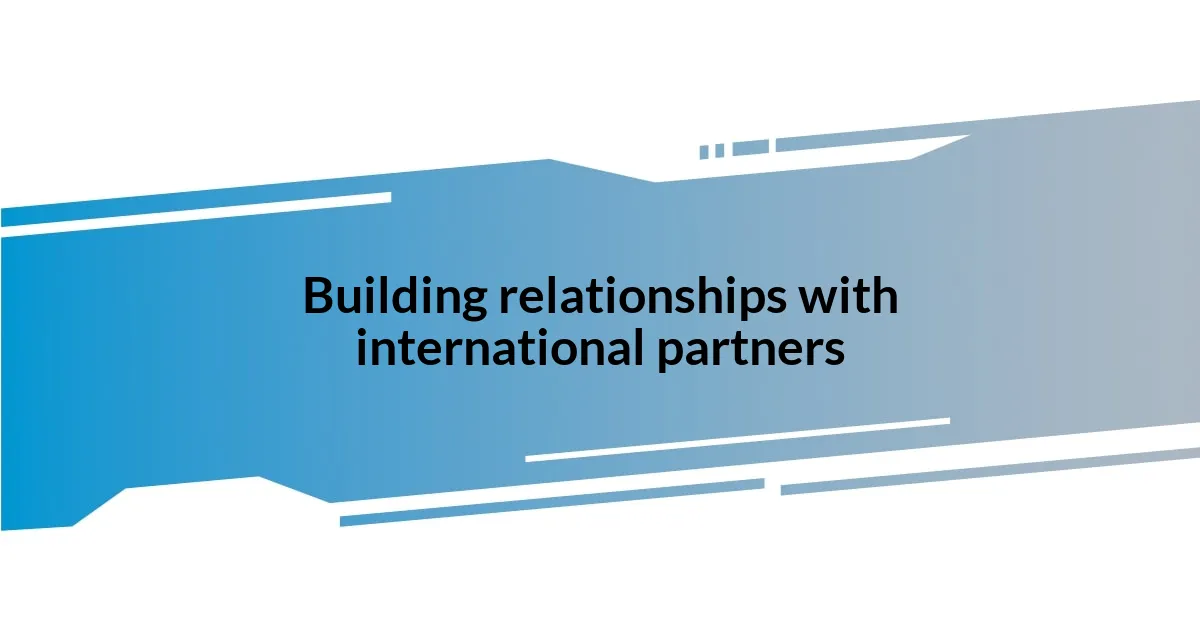
Building relationships with international partners
Building strong relationships with international partners is essential for success in overseas deals. I remember attending a trade show in a foreign country, where I struck up a conversation over coffee with a potential partner. That casual discussion turned into a cornerstone of our partnership. The personal connection we established made future business communications much easier. Have you ever had a conversation that was unexpectedly pivotal in your professional journey?
Each culture has its own nuances, and understanding these can create a solid foundation for trust. For me, learning a few phrases in my partner’s native language not only impressed them but also demonstrated my commitment to the relationship. Small gestures like these resonate deeply. It’s often the little things that signify respect and eagerness to connect that truly enhance our interactions.
In contrast, a lack of relationship-building can lead to misunderstandings and missed opportunities. I recall a project that fell flat because we relied solely on emails and formal communications. It felt transactional, and honestly, it was disheartening. Reflections like this remind me that investing time in personal relationships can significantly influence the long-term success of any deal.
| Relationship Approach | Impact |
|---|---|
| Casual Discussions | Fosters personal connections and trust |
| Language Use | Demonstrates commitment and respect |
| Formal Communications | Often leads to misunderstandings |
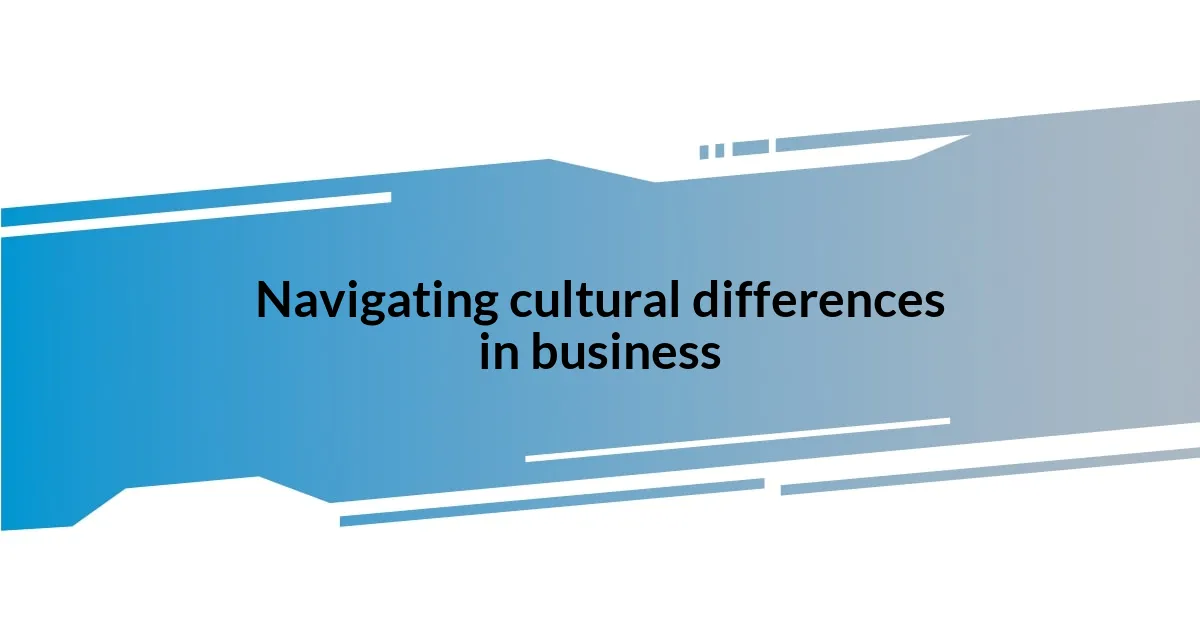
Navigating cultural differences in business
Navigating cultural differences in business can often feel like walking a tightrope. During my experience negotiating a contract in Japan, I noticed how crucial it was to embrace their concept of “wa,” which emphasizes harmony and consensus. Instead of jumping straight into business, I took time to engage in polite conversation and showed genuine interest in their customs. That small shift in my approach helped create a more comfortable atmosphere for discussion. Have you ever realized that a simple change in your demeanor could open doors?
One of the most eye-opening moments for me occurred while negotiating with a team from Brazil. I initially struggled with their open expressions and animated discussions. It felt overwhelming and chaotic at first, but I gradually realized that this was their way of building rapport. Adapting to their communication style not only made me feel more at ease, but it also paved the way for more open and honest exchanges. It reminded me of how rich and rewarding it can be to step outside our comfort zones and embrace the unfamiliar, wouldn’t you agree?
Cultural differences not only affect communication but also negotiation tactics. I’ll never forget my first deal in the Middle East, where I learned the importance of patience. The pace of discussions slowed significantly compared to what I was used to. Instead of feeling frustrated, I chose to view this as an opportunity to engage deeply and understand their priorities. That patience paid off, ultimately leading to a mutually beneficial agreement. It’s fascinating how adapting to cultural nuances can transform your approach and the outcome of your deals.
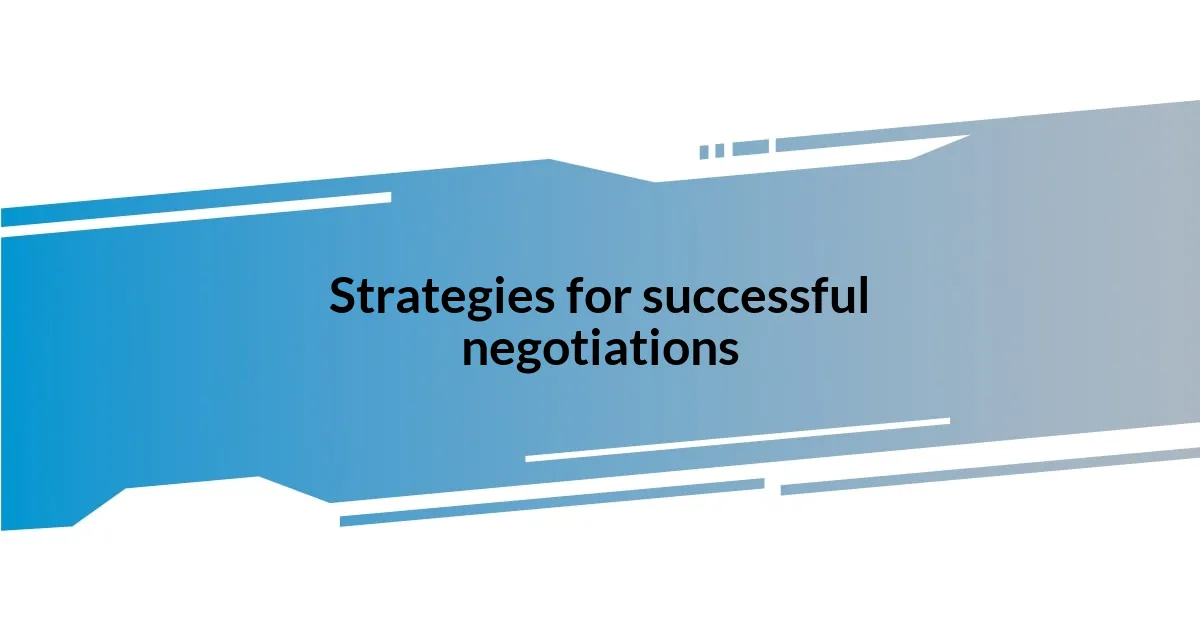
Strategies for successful negotiations
Effective negotiation requires a blend of strategy and sensitivity. I recall a negotiation with a potential partner in Italy, where I shifted the conversation from rigid terms and conditions to a more collaborative brainstorming session. By inviting them to share their thoughts and ideas, we both felt empowered, leading to a more creative and satisfying outcome. Have you ever noticed how discussions can flow so much better when everyone feels included and valued?
Preparation is just as crucial as execution in negotiations. Prior to a deal with a UK-based company, I invested time in understanding their business landscape and key players. This research equipped me to speak their language—literally and figuratively. When I referenced specific market trends that mattered to them, it sparked excitement and a sense of partnership. It made me wonder how often we underestimate the power of thorough preparation before entering negotiation discussions.
Lastly, maintaining flexibility can be a game changer during negotiations. I vividly remember negotiating terms with a supplier from India, where the unexpected came into play. As we delved into price points, a sudden regional policy change impacted their proposals. Instead of holding firm to my initial expectations, I chose to listen and explore alternative solutions. This adaptability not only salvaged the deal but also strengthened our working relationship. It’s during these unexpected moments that true collaboration can emerge, wouldn’t you agree?
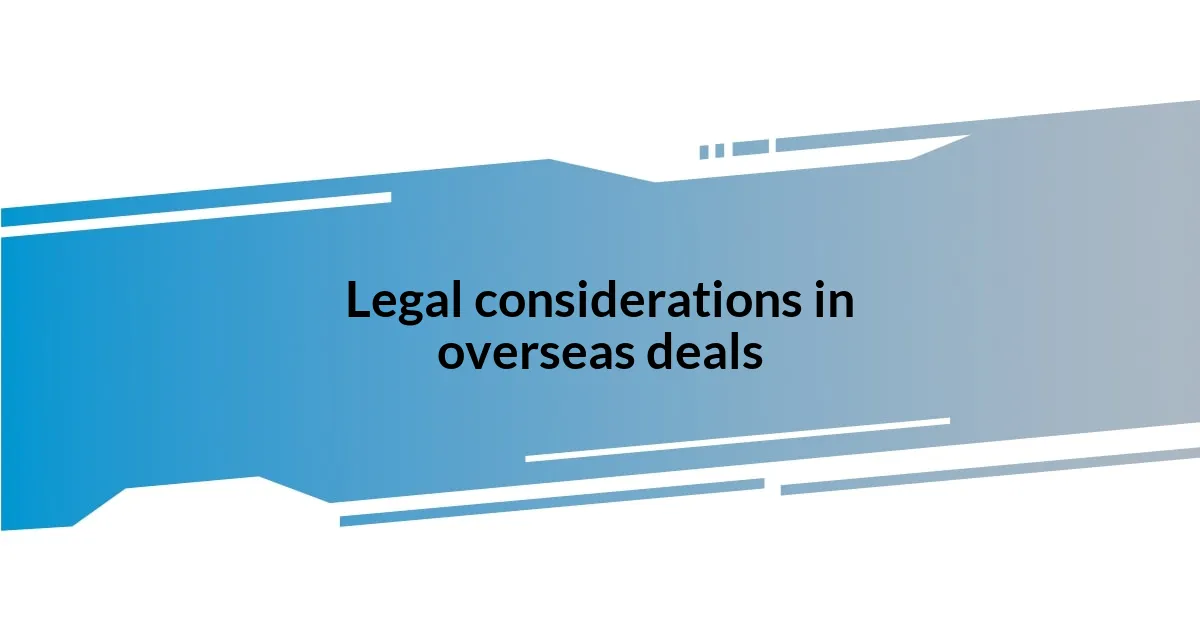
Legal considerations in overseas deals
Legal considerations in overseas deals are often more complex than one might anticipate. When I first engaged in a trade agreement with a company in France, I learned the hard way about the importance of understanding local laws. There, I found that specific contractual terms needed to comply with French commercial code, which takes precedence over many common business practices I was accustomed to. Can you imagine the surprise of realizing that a simple clause I had included was rendered ineffective because I hadn’t done my due diligence?
Moreover, I’ve had experiences where differing legal interpretations led to roadblocks. While working on a project in Germany, I encountered stringent data protection regulations under their version of the GDPR. Misunderstanding these rules could’ve resulted in significant penalties for both parties. This realization reinforced the importance of consulting with a local legal expert who was not only familiar with the laws but also understood the cultural nuances surrounding them. Don’t you think investing in legal advice is essential when crossing borders?
Finally, I’ve learned that intellectual property rights can be a minefield when closing overseas deals. In a venture in China, I was anxious about protecting our innovations amid contrasting enforcement standards. The lack of familiarity with local patent laws created a sense of apprehension. However, I quickly recognized that proactively registering our trademarks and patents in their system was the key step needed to safeguard our interests. Have you ever pondered how much peace of mind a solid legal strategy can provide when navigating the global marketplace?

Lessons learned from my experience
Throughout my journey in closing overseas deals, I’ve learned that patience is more than just a virtue—it’s essential. I recall a particularly drawn-out negotiation with a Dutch firm, where I initially felt frustrated by the slow pace. However, as time progressed, I realized that this methodical approach allowed us to build trust. It made me wonder: how often do we rush negotiations and inadvertently overlook the value of connection?
Cultural sensitivity has also proven to be pivotal in my experiences. During a deal with a South Korean partner, I quickly sensed that our directness might be perceived as abrasive. I chose to adapt, taking the time to express appreciation for their ideas and insights. This shift not only diffused potential tension but also opened the door to more fruitful discussions. Have you ever adjusted your communication style and seen it transform the interaction?
Finally, I’ve come to understand the importance of follow-up and relationship maintenance after the deal. While working with a client in Brazil, I initially focused solely on closing the agreement. However, I soon recognized that regularly checking in helped solidify our partnership and fostered future opportunities. It highlighted for me that closing a deal is just the beginning. Wouldn’t you agree that nurturing those relationships often leads to even greater success?
